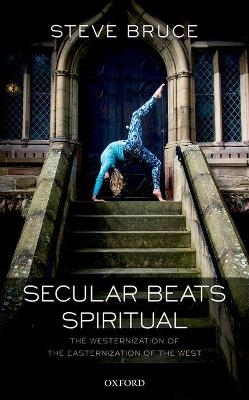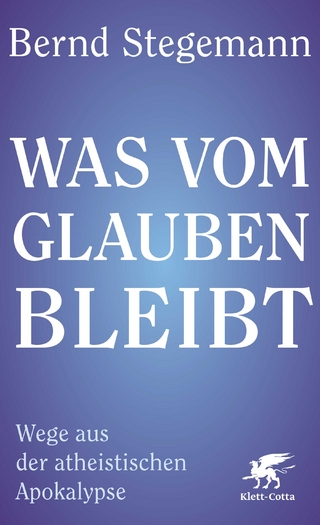
Secular Beats Spiritual
The Westernization of the Easternization of the West
Seiten
2017
Oxford University Press (Verlag)
978-0-19-880568-7 (ISBN)
Oxford University Press (Verlag)
978-0-19-880568-7 (ISBN)
This study offers a detailed study of the religious and spiritual innovations of the last 50 years. It assesses their popularity in the UK and concludes that the 'not decline-just change' view cannot be sustained. Serious interest in spirituality has grown far less quickly than has the number of us who have no religious or spiritual interest.
The decline of the Christian churches in the West is undeniable but commentators differ in their understanding of what this represents. For some it shows a decline in interest in religion as such; for others, religion has not declined, it has only changed its shape. Possible candidates for Christianity's replacement are the new religious movements of the late 1960s and what is variously called New Age, alternative or contemporary spirituality. Secular Beats Spiritual offers a detailed study of the religious and spiritual innovations of the last 50 years. It assesses their popularity in the UK and concludes that the 'not decline-just change' view cannot be sustained. Serious interest in spirituality has grown far less quickly than has the number of us who have no religious or spiritual interest. The most popular and enduring movements have been the least religious ones and those that have survived have done so by becoming more 'this-worldly' and less patently religious or spiritual. Yoga is popular but as a secular exercise programme; Transcendental Meditation now markets its meditational technique as a purely secular therapy; British Buddhists now offer the secular Mindfulness; and the Findhorn Foundation (Europe's oldest New Age centre) is no longer the germ of a counter-cultural communalism but sells its expertise to major corporations. Steve Bruce also demonstrates that, although eastern religious themes (such as reincarnation and karma) have become more popular as the power of the Christian churches to stigmatise them has declined, such themes have also been significantly altered so that what superficially looks like the easternization of the West might better be described as the westernization of the easternization of the West.
The decline of the Christian churches in the West is undeniable but commentators differ in their understanding of what this represents. For some it shows a decline in interest in religion as such; for others, religion has not declined, it has only changed its shape. Possible candidates for Christianity's replacement are the new religious movements of the late 1960s and what is variously called New Age, alternative or contemporary spirituality. Secular Beats Spiritual offers a detailed study of the religious and spiritual innovations of the last 50 years. It assesses their popularity in the UK and concludes that the 'not decline-just change' view cannot be sustained. Serious interest in spirituality has grown far less quickly than has the number of us who have no religious or spiritual interest. The most popular and enduring movements have been the least religious ones and those that have survived have done so by becoming more 'this-worldly' and less patently religious or spiritual. Yoga is popular but as a secular exercise programme; Transcendental Meditation now markets its meditational technique as a purely secular therapy; British Buddhists now offer the secular Mindfulness; and the Findhorn Foundation (Europe's oldest New Age centre) is no longer the germ of a counter-cultural communalism but sells its expertise to major corporations. Steve Bruce also demonstrates that, although eastern religious themes (such as reincarnation and karma) have become more popular as the power of the Christian churches to stigmatise them has declined, such themes have also been significantly altered so that what superficially looks like the easternization of the West might better be described as the westernization of the easternization of the West.
Steve Bruce is Professor of Sociology at the University of Aberdeen. His previous publications include Secularization: In Defence of an Unfashionable Theory (2013), Paisley: Religion and Politics in Northern Ireland (2007), Sociology: A Very Short Introduction (2000), and Choice and Religion: A Critique of Rational Choice Theory (1999). He is also the editor of Bryan R. Wilson's Religion in Secular Society: Fifty Years On (2016).
List of Tables and Figures
1: The Secularization of the West
2: Contemporary Spirituality
3: Yogins and Yoga
4: Buddhism Religious and Secular
5: Islam: the Unpopular Eastern Religion
6: Counting the Spiritual
7: The Secular Beats the Spiritual
Bibliography
| Erscheinungsdatum | 02.11.2017 |
|---|---|
| Verlagsort | Oxford |
| Sprache | englisch |
| Maße | 152 x 223 mm |
| Gewicht | 408 g |
| Themenwelt | Geisteswissenschaften ► Religion / Theologie |
| Sozialwissenschaften ► Ethnologie | |
| Sozialwissenschaften ► Soziologie | |
| ISBN-10 | 0-19-880568-3 / 0198805683 |
| ISBN-13 | 978-0-19-880568-7 / 9780198805687 |
| Zustand | Neuware |
| Informationen gemäß Produktsicherheitsverordnung (GPSR) | |
| Haben Sie eine Frage zum Produkt? |
Mehr entdecken
aus dem Bereich
aus dem Bereich
Wege aus der atheistischen Apokalypse
Buch | Hardcover (2024)
Klett-Cotta (Verlag)
25,00 €


